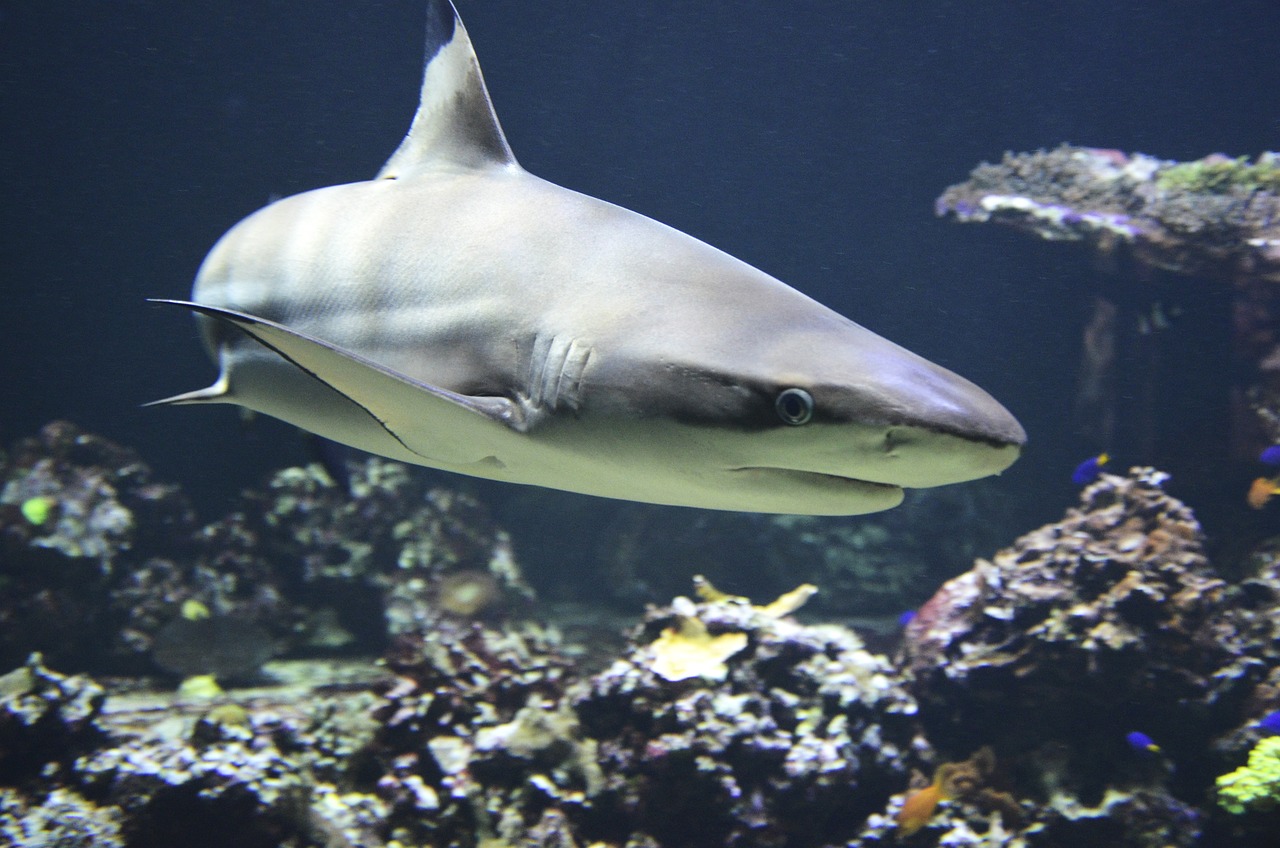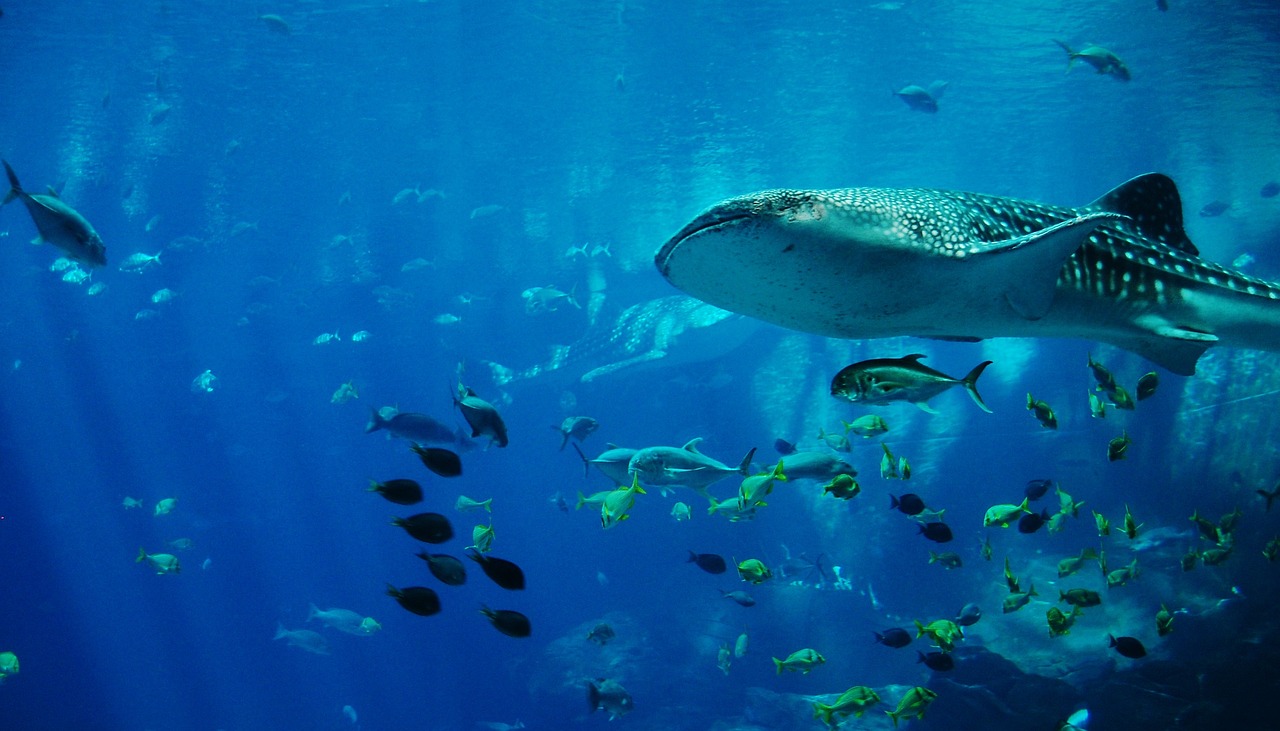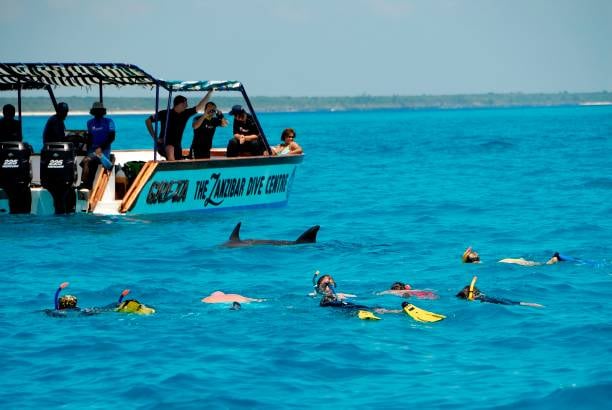The Ultimate Guide to Sharks in Zanzibar: Safety and Experience Tips


Introduction to Zanzibar’s Shark Population
Zanzibar is a popular destination for diving and snorkeling in the Indian Ocean, with a rich biodiversity of marine life. The archipelago is home to a variety of shark species, including whale sharks, reef sharks, and others.
The vibrant coral reefs of Zanzibar provide a vital habitat for sharks, supporting an intricate marine ecosystem. These reefs are not only essential for the survival of sharks but also host a dazzling array of marine life, making Zanzibar a haven for underwater exploration.
Despite the presence of sharks in Zanzibar, its waters are widely regarded as safe for swimming and diving.
Visitors can enjoy the unique opportunity to witness these fascinating creatures in their natural habitat while experiencing the unmatched beauty of the Indian Ocean.
Overview of the Indian Ocean’s Aquatic Denizens
The Indian Ocean is home to a vast array of marine life, offering an underwater spectacle that captivates divers and snorkelers alike. Its coral reefs teem with tropical fish, marine creatures, and a rich variety of vibrant species.
Zanzibar, situated along the East African coast, is a hotspot for marine biodiversity, attracting enthusiasts eager to explore its reefs.
The warm waters of the Indian Ocean create an ideal environment for an abundance of marine life.
Iconic species such as angelfish, butterflyfish, and parrotfish are commonly found weaving through the coral reefs, while larger marine creatures like turtles, moray eels, and rays thrive in this ecosystem.
Shark species, including reef sharks and the majestic whale sharks, add to the allure, making Zanzibar a prime destination for underwater adventures.
Zanzibar’s coral reefs play a critical role in supporting these ecosystems by offering food, shelter, and breeding grounds for countless species.
These reefs are living structures, bustling with activity, and are a testament to the ocean's resilience and beauty. The diversity of tropical fish and marine creatures in this region underscores the ecological importance of preserving such habitats for future generations.
Where to See Whale Sharks in Zanzibar

Whale sharks, the gentle giants of the ocean, can be spotted in several locations around Zanzibar.
The most renowned spot is Mnemba Atoll, located off the northeast coast of the Zanzibar Islands. This area is famous for its crystal-clear waters, making it one of the best places in East Africa to encounter whale sharks.
These creatures are often seen during the peak season, from October to March, when the waters are calm and teeming with plankton, their primary food source.
While Mnemba Atoll remains the prime location, whale sharks can also be found around other areas of the Zanzibar Islands, particularly around Mafia Island, which is part of the Zanzibar archipelago.
The warm waters surrounding these islands provide an ideal habitat for these magnificent creatures, offering divers and snorkelers the unique opportunity to swim alongside them.
Zanzibar’s strategic location in East Africa makes it a prime destination for whale shark encounters, drawing visitors from all over the world.
The region’s protected marine environment, combined with its diverse aquatic ecosystems, ensures that encounters with these gentle giants remain a safe and awe-inspiring experience.
Shark Species in Zanzibar
Whale Sharks: Gentle Giants of the Ocean

Whale sharks, the largest fish in the world, are a remarkable sight in Zanzibar’s waters.
These gentle giants are especially prevalent around Mafia Island, a hotspot for marine enthusiasts seeking an unforgettable encounter.
Harmless to humans, whale sharks can be safely swum with, making them a favorite among divers and snorkelers.
The best time to spot whale sharks in Zanzibar is between October and March, when plankton blooms attract these filter feeders closer to the shore.
Mafia Island’s protected waters provide an ideal environment for observing these magnificent creatures, offering visitors an unparalleled opportunity to experience the wonders of the ocean up close
Reef Sharks and Other Species
Reef sharks are among the most commonly encountered sharks in Zanzibar, with species like the whitetip reef shark frequently spotted around coral reefs.
Known for their sleek bodies and agile swimming, reef sharks are often seen patrolling shallow waters, particularly in areas rich with marine biodiversity.
These sharks are non-aggressive and generally avoid human interaction, making them a fascinating yet safe sight for divers.
Other shark species, such as tiger sharks and hammerhead sharks, also inhabit the waters around Zanzibar, though they are less commonly seen.
Tiger sharks, often referred to as the “garbage eaters” of the ocean, are known for their varied diet and adaptability, while hammerhead sharks are admired for their distinctive head shapes and schooling behavior.
It’s important to note that shark attacks are extremely rare in Zanzibar, as most sharks are not naturally aggressive toward humans.
With proper awareness and respect for these creatures, encounters can be both safe and awe-inspiring. Zanzibar’s diverse shark population highlights the rich marine life of the Indian Ocean and underscores the importance of preserving these ecosystems for future generations.
Safety and Precautions
Shark Attack Statistics and Reality
Shark attacks in Zanzibar are extremely rare, and most sharks found in the area are not aggressive toward humans.
In fact, the risk of encountering a dangerous situation is significantly lower than many may assume.
While global shark attack statistics often make headlines, Zanzibar’s waters remain one of the safest places to swim and dive.
Comparisons with global shark attack data reveal that the likelihood of an attack in Zanzibar is much lower, as the majority of shark species here, like reef sharks and whale sharks, are typically non-threatening.
Globally, shark attacks occur mainly in areas with high human interaction and aggressive species, but this is not the case in Zanzibar.
The peaceful nature of Zanzibar's marine life, coupled with local regulations ensuring safe encounters, further enhances its reputation as a safe destination for diving and snorkeling.
However, as with any natural habitat, it is important to take certain precautions and follow safety guidelines when exploring these waters.
Best Practices for Safe Swimming and Diving

For a safe and enjoyable experience, always swim and dive with a reputable operator who is familiar with Zanzibar’s waters and its unique marine life.
These operators will provide you with essential safety briefings, ensuring you know what to expect when swimming or diving in the area.
When swimming or diving, avoid areas where sharks are known to frequent, especially during their active hours, which are typically early morning or late afternoon.
Families with young children should always ensure that their little ones are supervised and swim in designated safe areas to reduce any potential risks.
It’s also crucial to refrain from swimming with open wounds or bleeding, as this can attract sharks.
Furthermore, maintaining a calm and composed demeanor in the water can help prevent startling or agitating any marine life.
By following these simple guidelines, you can ensure a safe and memorable aquatic adventure along the coast of Zanzibar.
Diving and Snorkeling in Zanzibar
Best Places to Snorkel and Dive

Diving with dolphins at Mnemba Attol, Zanzibar.
Zanzibar offers some of the most breathtaking dive sites in the Indian Ocean, catering to both beginners and experienced divers.
The famous Mnemba Atoll, a protected marine reserve, is renowned for its crystal-clear waters and vibrant coral reefs teeming with marine life. This site is perfect for divers of all levels, with shallow areas for snorkeling and deeper sections for advanced divers seeking a more challenging experience.
Another must-visit destination is Pemba Island, often referred to as Zanzibar’s “Green Island.” Known for its dramatic drop-offs and thriving coral reefs, Pemba is a paradise for advanced divers looking for thrilling underwater adventures. Popular sites like the Pemba Channel are home to large pelagic species, including barracudas and tuna.
Closer to the mainland, Stone Town serves as a convenient base for snorkeling and diving excursions. Many tour operators offer guided trips to nearby reefs, ensuring safe and informative adventures. With its proximity to some of the best Zanzibar beaches, Stone Town is ideal for combining underwater exploration with coastal relaxation
Marine Life Encounters
Zanzibar’s coral reefs are a haven for an incredible variety of marine life, making every dive and snorkeling session a unique experience.
The waters are home to majestic green turtles, playful dolphins, and even the occasional whale shark. These encounters are especially common during peak seasons, typically from October to March, when plankton blooms attract these creatures closer to shore.
In addition to larger species, the reefs around Zanzibar are alive with vibrant tropical fish and smaller marine creatures, such as nudibranchs and shrimp.
The island’s warm waters and abundant coral reefs create a thriving ecosystem that provides endless opportunities for underwater photography and observation.
For the best marine life experiences, consider diving early in the morning or during a full moon, as these times often increase the chances of spotting rare species.
Zanzibar’s reefs promise unforgettable encounters for anyone passionate about the underwater world.
The Thrill of Diving with Sharks in Zanzibar

Divers dressed in Santa Claus outfits feed a shark
Diving with sharks in Zanzibar is an unforgettable experience for thrill-seekers and marine enthusiasts.
The clear waters surrounding the Zanzibar Islands offer exceptional visibility, making it an ideal destination for scuba diving adventures.
One of the most exciting encounters is with the gentle whale sharks, the largest fish in the world, which can be spotted around Mafia Island and Mnemba Atoll.
These magnificent creatures, despite their size, are harmless to humans and offer divers a unique opportunity to swim alongside them in their natural habitat.
In addition to whale sharks, Zanzibar is home to several species of reef sharks, including whitetip reef sharks. These sharks, along with other marine life, can be found while diving in the rich coral reefs that surround the islands.
Scuba diving in Zanzibar’s waters offers a one-of-a-kind chance to explore vibrant coral gardens, home to a variety of fish and marine creatures, creating an unforgettable underwater experience.
The thrill of diving with sharks in Zanzibar is amplified by the stunning beauty of its oceanic landscapes. With its pristine coral reefs, diverse marine species, and crystal-clear waters, Zanzibar provides divers with a world-class diving experience that will leave them in awe of the underwater world.
Planning Your Trip to Zanzibar
When to Go: Best Time for Swimming and Diving
The best time to visit Zanzibar for swimming and diving is during the peak season, from July to September and December to January.
This period offers ideal conditions with warm, sunny weather and crystal clear waters, perfect for exploring the island’s vibrant coral reefs. Zanzibar’s waters remain calm and inviting, creating the perfect environment for both novice and experienced divers.
However, it's essential to consider the peak season when planning your trip. While the weather is consistently favorable, the higher influx of tourists means crowded dive sites, and prices tend to rise.
For those looking to avoid the busiest times, visiting outside of the peak months still guarantees pleasant weather, with clear waters and fewer tourists.
Travelers can also find more affordable rates during these off-peak months, saving money while still enjoying the natural beauty Zanzibar offers year-round.
Responsible Tourism and Conservation
Supporting Sustainable Tourism in Zanzibar
Zanzibar's commitment to sustainable tourism helps protect its incredible biodiversity, including its marine life and coral reefs.
By supporting eco-friendly operators who focus on preserving the island’s natural resources, visitors can actively contribute to conservation efforts.
Many local groups are dedicated to protecting Zanzibar’s delicate ecosystem, and tourists can get involved in activities like reef restoration projects or wildlife conservation initiatives.
Choosing responsible operators also means supporting the local communities of Zanzibar. Local people benefit from tourism that promotes sustainability, as eco-friendly tourism creates jobs while preserving the island's charm and beauty.
By opting for eco-conscious accommodations and activities, travelers ensure their visit leaves a positive, long-term impact. Supporting sustainable tourism is not just about respecting the environment; it’s also about respecting and uplifting the communities that rely on Zanzibar’s natural resources for their livelihoods.
Whale Shark Conservation Efforts in Zanzibar
Zanzibar is taking significant steps in whale shark conservation, with numerous initiatives aimed at protecting these majestic creatures. The island's reefs are vital to whale sharks, offering a healthy habitat for them to thrive.
Conservation efforts focus on safeguarding the delicate marine ecosystem, including efforts to prevent overfishing and the impact of fishing boats on local marine life.
One of the key goals is to ensure that whale sharks continue to visit Zanzibar's waters year-round, providing eco-conscious travelers and divers with opportunities to experience these magnificent creatures in their natural habitat.
In addition to whale sharks, Zanzibar's marine ecosystem is home to a wide variety of other species, such as humpback whales, green turtles, and manta rays, all of which benefit from these conservation efforts.
Visitors to Zanzibar’s southeast coast and the main island can engage in responsible tourism by supporting eco-friendly operators who promote sustainable practices.
The efforts to preserve Zanzibar’s rich marine life extend beyond just whale sharks. Marine conservation projects focus on protecting species like hawksbill turtles and manta rays, ensuring that the island's aquatic environment remains a healthy haven for these endangered species.
Additionally, Zanzibar's commitment to preserving its deep waters and coral reefs continues to attract eco-tourism, making the island an island paradise for those passionate about marine life and conservation.
Ready for Your Shark Adventure?
Zanzibar offers some of the best diving experiences in the world, especially when it comes to diving with sharks.
From the incredible whale sharks at Mnemba Atoll to the thrill of exploring forgotten shipwrecks, there’s something for every adventurer.
Whether you’re a beginner or an experienced diver, Zanzibar’s warm, clear waters are the perfect backdrop for your next dive. Don't forget to book your tour through the easy-to-use WhatsApp button and get ready to discover the wonders of Zanzibar's underwater world!
FAQs About Shark Diving in Zanzibar
Is diving with sharks in Zanzibar safe?
Yes, diving with sharks in Zanzibar is considered safe. The sharks in the region, including the whale sharks and reef sharks, are generally not aggressive. Zanzibar’s dive operators prioritize safety, with experienced guides ensuring a secure and thrilling experience for all participants.
However, as with all water activities, it's always essential to follow the instructions of your guide and dive within your comfort zone.
Also, remember to consider travel insurance for peace of mind while traveling and diving.
What time of year is best for whale shark sightings?
The best time to spot whale sharks in Zanzibar is between October and February. During this period, the waters around Zanzibar's islands, including the main island and small islands, are teeming with marine life.
Whale sharks are particularly abundant in these months, drawn to the warm waters and abundant plankton. This is also when divers have the best chances of seeing not only whale sharks but also humpback whales and manta rays, making it the peak season for marine life encounters.
How can I book a shark diving tour in Zanzibar?
Booking a shark diving tour in Zanzibar is simple! To secure your spot, just click the WhatsApp button at the bottom right of the page. This will connect you directly with local operators who offer personalized diving tours to see sharks and other marine life.
From the main island of Zanzibar to Pemba Island, dive trips are available to suit different levels of experience. Whether you're a first-time diver or a seasoned expert, there are options to ensure you have an unforgettable underwater adventure.
Where can I see other marine life like manta rays and humpback whales?
Manta rays can often be seen around Mnemba Atoll and the southeast coast of Zanzibar. Humpback whales, meanwhile, migrate through Zanzibar’s waters, particularly around the east coast, from July to October. While on your journey, you might encounter other marine life as well.
Is it safe to swim in Zanzibar?
Yes, it is generally safe to swim in Zanzibar. The island’s calm, warm waters and designated swimming areas make it a safe destination for beachgoers. While marine life is abundant, incidents involving sharks or dangerous sea creatures are extremely rare. Always follow local guidelines and swim with caution near reefs or during low tide.



